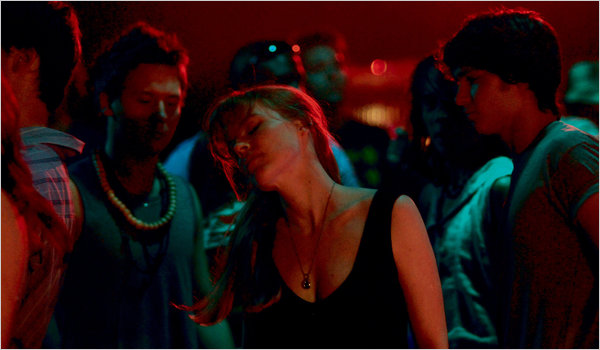|
Reviews of Recent Independent, Foreign, & Documentary Films in Theaters and DVD/Home Video

HIDEAWAY (LE REFUGE) The opening shot of François Ozon’s new film is a live-action postcard of glittery nighttime Paris, with the bouncing city lights reflected in the Seine. Barely two minutes into the film, Ozon pulls the rug out from under the audience, as he will again. Moving from glamour to grit, the camera follows a man from a train into an apartment, which is almost vacant except for the two strung-out junkies sprawled out on a futon mattress. Hollow-eyed and with splotchy skin, the attractiveness of the young man and woman still shines through, but before viewers have a chance to wallow in heroin chic, Ozon dares them to look away as the junkies scan their arms for viable veins. Now that Ozon has the audience’s attention, he retains it, not so much through provocation but by providing the basics—strong acting, empathetic characters, and concise dialogue. Ozon is a gifted writer of not-so-innocuous-and-casual conversation, one of the few writer/directors from whom I want more, economical script be damned. His characters get straight to the point. Not fully forthcoming, they leave a lot to the imagination. You’re bound to be hooked (even if just a little bit), though the sudden mood shifts verge on vagueness at certain points. One of the aforementioned heroin users, Mousse (an oddly diminutive name for such a strong presence), wakes up in the emergency room and asks for her boyfriend, Louis (the briefly seen Melvil Poupaud). She’s informed that he OD’d. She also finds out she’s pregnant. Her appearance at Louis’s funeral mass—wearing knee-high boots, jeans, and a faux-leopard skin jacket—hardly wins over his grieving family. At the family's chateau, she finally has a one-on-one with Louis’s aristo mother and tells her she’s expecting. The mother’s response: she assumes Mousse will have an abortion. Besides the drug den, there’s a second hideaway, or refuge, as it’s called in the original French title, which lies along the Atlantic coast not far from the Spanish border where Mousse has found seclusion now that she hasn’t followed Louis’s mother’s wishes. Well into her pregnancy, she’s not entirely free from old habits, keeping a handy bottle of methadone in the medicine cabinet. (Actress Isabelle Carré was pregnant at the time of filming, which prompted Ozon to fast-forward the production. No prosthetics were necessary.) Under her hardened exterior, Mousse exudes an innate sense of class, if not of poise. She’s a stealth weapon. Her long-blond hair and pale-skinned exterior belie her prickliness. Ozon stirs up the pot with the arrival of Louis’s younger brother, the lanky, model-handsome, and gay Paul (strikingly, this is the relaxed and assured Louis-Ronan Choisy’s first film role.) Out on the beach, he’s the object of the female gaze (Mousse’s) through the male director’s male lens, an additional layer to their mutating relationship. A lot is left unsaid, including why Paul unexpectedly arrived to look after the mother of his brother’s child—he had only previously met her at the wake. The audience fills in the gaps, always a few beats behind the mercurial Mousse. The film’s only stab at pop psychology is her casual bombshell that the man from whom she’s renting her retreat is a family friend she slept with when she was 16 who also thinks he’s her dad. Her past, otherwise, is a blank. Based on what we do know, this is a much more blunt, and thoughtful, depiction of a woman learning “to live again” (whatever that means) than in all of the 132 minutes of Eat Pray Love—a rollercoaster ride in comparison. Yet for all of the
nagging gaps (or narrative short cuts), there’s a lot to be said for the
camera simply lingering on Carré alone, leaving her to carry the film.
In a scene at a disco, Mousse, belly swaying to the music, dances by
herself and then slowly negotiates with a dance partner where and
what to touch before she turns away, dismissing him. Revealing and
voyeuristic, it's mesmerizing.
Kent Turner
|

